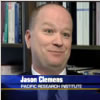
SAN FRANCISCO (KGO) — On the anniversary of a financial meltdown that brought Wall Street to its knees, President Barack Obama unveiled a plan he says will keep it from happening again.
President Obama began by praising his economic team and his $787 billion stimulus package.
“While full recovery of the financial system will take a great deal more time and work, the growing stability resulting from these interventions means we are beginning to return to normalcy,” Mr. Obama said.
The president warned that normalcy cannot lead to complacency and outlined rules to overhaul the financial system, including a consumer financial protection agency.
“Consumers shouldn’t have to worry about loan contracts designed to be unintelligible, hidden fees attached to their mortgages and financial penalties, whether though a credit card or debit card, that appear without warning on their statements,” he said.
Mr. Obama said he will make it more expensive for financial institutions to grow so large or interconnected that they are considered too big to fail and he will work with other countries to institute similar regulations abroad.
“As the United States is aggressively reforming our regulatory system we’re going to be working to ensure that the rest of the world does the same,” he said.
But at the free market Pacific Research Institute Jason Clemens says there were regulations in place before the meltdown.
“Look at the Community Reinvestment Act, look at the tax reform act of ’97, look at the Basel II accord and how it regulated international banking,” Clemens said.
Clemens says lack of regulation was not the problem. And, he says, if that is the president’s premise, it could lead to more mistakes.
“If at your first step you’ve misdiagnosed the problem at its cause then it’s going to be very difficult to get the right solution,” Clemens said.
Monday afternoon the head of the Federal Reserve Bank of San Francisco weighed in.
“Well we had rules, but the rules were probably not strong enough and the enforcement of those rules was extremely uneven,” Janet Yellen said.
Yellen points to her own agency; the Federal Reserve says when it came to protecting homeowners from the mortgage meltdown there were rules in place, but enforcement came too slow.
“I think looking back I wish we had done it sooner and we could’ve done it sooner,” Yellen said.
Yellen told a meeting of financial analysts in San Francisco that the Bay Area’s recovery will be slowed by a lack of jobs, but on the upside she is seeing an uptick in venture capital investment and the housing market is picking up even at the high end.
(Copyright ©2009 KGO-TV/DT. All Rights Reserved.)
Experts weigh in on Obama economic speech
Mark Matthews
SAN FRANCISCO (KGO) — On the anniversary of a financial meltdown that brought Wall Street to its knees, President Barack Obama unveiled a plan he says will keep it from happening again.
President Obama began by praising his economic team and his $787 billion stimulus package.
“While full recovery of the financial system will take a great deal more time and work, the growing stability resulting from these interventions means we are beginning to return to normalcy,” Mr. Obama said.
The president warned that normalcy cannot lead to complacency and outlined rules to overhaul the financial system, including a consumer financial protection agency.
“Consumers shouldn’t have to worry about loan contracts designed to be unintelligible, hidden fees attached to their mortgages and financial penalties, whether though a credit card or debit card, that appear without warning on their statements,” he said.
Mr. Obama said he will make it more expensive for financial institutions to grow so large or interconnected that they are considered too big to fail and he will work with other countries to institute similar regulations abroad.
“As the United States is aggressively reforming our regulatory system we’re going to be working to ensure that the rest of the world does the same,” he said.
But at the free market Pacific Research Institute Jason Clemens says there were regulations in place before the meltdown.
“Look at the Community Reinvestment Act, look at the tax reform act of ’97, look at the Basel II accord and how it regulated international banking,” Clemens said.
Clemens says lack of regulation was not the problem. And, he says, if that is the president’s premise, it could lead to more mistakes.
“If at your first step you’ve misdiagnosed the problem at its cause then it’s going to be very difficult to get the right solution,” Clemens said.
Monday afternoon the head of the Federal Reserve Bank of San Francisco weighed in.
“Well we had rules, but the rules were probably not strong enough and the enforcement of those rules was extremely uneven,” Janet Yellen said.
Yellen points to her own agency; the Federal Reserve says when it came to protecting homeowners from the mortgage meltdown there were rules in place, but enforcement came too slow.
“I think looking back I wish we had done it sooner and we could’ve done it sooner,” Yellen said.
Yellen told a meeting of financial analysts in San Francisco that the Bay Area’s recovery will be slowed by a lack of jobs, but on the upside she is seeing an uptick in venture capital investment and the housing market is picking up even at the high end.
(Copyright ©2009 KGO-TV/DT. All Rights Reserved.)
Nothing contained in this blog is to be construed as necessarily reflecting the views of the Pacific Research Institute or as an attempt to thwart or aid the passage of any legislation.